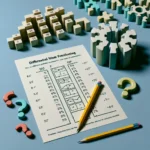Differential Item Functioning (DIF) in Cognitive Testing
Definition:
Differential Item Functioning (DIF) occurs when individuals from different groups (e.g., genders, races, or ethnicities) with the same underlying ability level have a different probability of answering a test item correctly or endorsing a particular response. DIF is an important concept in cognitive testing and educational measurement, where ensuring fairness and validity across diverse populations is essential.
Understanding DIF:
DIF analysis is used to detect items on a test that may be biased or function differently for one group compared to another. An item exhibits DIF when test-takers with the same ability, but from different groups, do not have an equal chance of selecting the correct answer or giving a particular response. DIF can be categorized as either uniform or non-uniform. Uniform DIF refers to a consistent level of difficulty across all ability levels, whereas non-uniform DIF means the level of difficulty changes across different ability levels.
Identifying DIF:
Modern psychometric techniques, such as Item Response Theory (IRT), are used to identify items with DIF. These methods often involve statistical tests, such as the Mantel-Haenszel method or logistic regression analysis. Items that show significant DIF can be reviewed for potential cultural bias, ambiguous wording, or content that may not be equally familiar to all groups.
Addressing DIF:
If an item is found to function differentially, test developers may revise or eliminate it to maintain the test’s fairness and validity. Ensuring that cognitive tests are free from DIF is crucial as these assessments are used to make important decisions about education, employment, and psychological evaluation.
Relevance of DIF in Cognitive Testing:
DIF analysis helps uphold the standards of equity in cognitive testing. It is a key tool for educators, psychologists, and test developers for creating assessments that accurately reflect an individual’s abilities, irrespective of their group membership. By actively researching and correcting for DIF, professionals can produce more reliable and valid test scores, leading to fairer educational and clinical outcomes.
Conclusion:
Differential Item Functioning is a vital aspect of cognitive test development and analysis, aimed at detecting bias and ensuring that test items are appropriate and equitable for all examinees. As society increasingly values fairness in educational and psychological assessments, understanding and addressing DIF becomes ever more crucial in the field of psychometrics.

